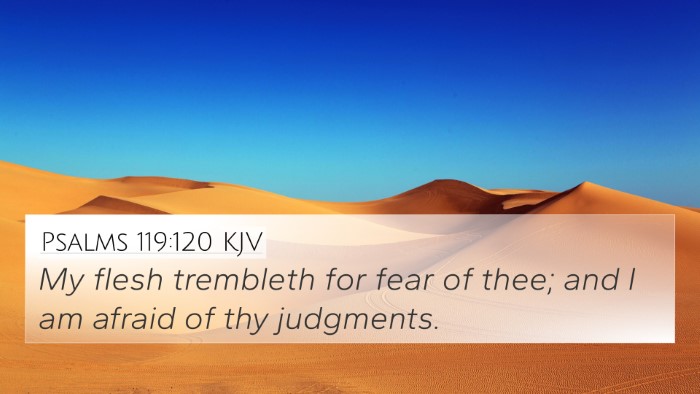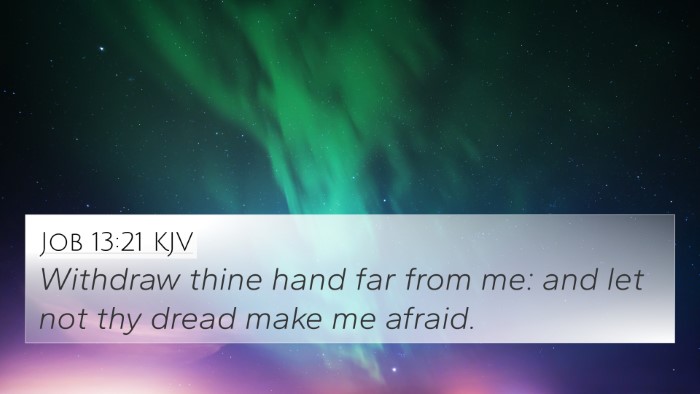Old Testament
Genesis Exodus Leviticus Numbers Deuteronomy Joshua Judges Ruth 1 Samuel 2 Samuel 1 Kings 2 Kings 1 Chronicles 2 Chronicles Ezra Nehemiah Esther Job Psalms Proverbs Ecclesiastes Song of Solomon Isaiah Jeremiah Lamentations Ezekiel Daniel Hosea Joel Amos Obadiah Jonah Micah Nahum Habakkuk Zephaniah Haggai Zechariah MalachiJob 13:11 Similar Verses
Job 13:11 Cross References
Shall not his excellency make you afraid? and his dread fall upon you?
Uncover the Rich Themes and Topics of This Bible Verse
Listed below are the Bible themes associated with Job 13:11. We invite you to explore each theme to gain deeper insights into the Scriptures.
Job 13:11 Cross Reference Verses
This section features a detailed cross-reference designed to enrich your understanding of the Scriptures. Below, you will find carefully selected verses that echo the themes and teachings related to Job 13:11 KJV. Click on any image to explore detailed analyses of related Bible verses and uncover deeper theological insights.

Job 31:23 (KJV) »
For destruction from God was a terror to me, and by reason of his highness I could not endure.
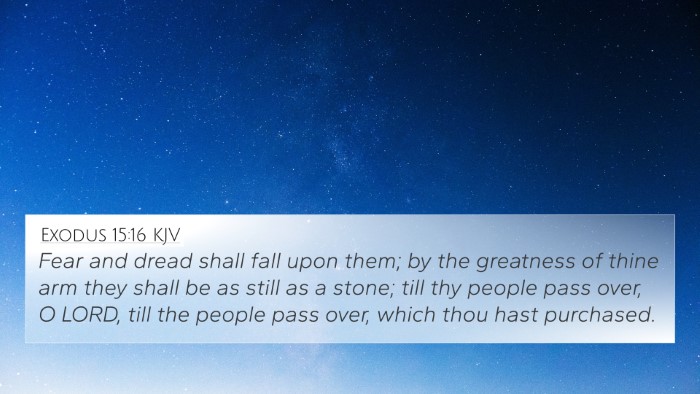
Exodus 15:16 (KJV) »
Fear and dread shall fall upon them; by the greatness of thine arm they shall be as still as a stone; till thy people pass over, O LORD, till the people pass over, which thou hast purchased.

Isaiah 8:13 (KJV) »
Sanctify the LORD of hosts himself; and let him be your fear, and let him be your dread.

Jeremiah 5:22 (KJV) »
Fear ye not me? saith the LORD: will ye not tremble at my presence, which have placed the sand for the bound of the sea by a perpetual decree, that it cannot pass it: and though the waves thereof toss themselves, yet can they not prevail; though they roar, yet can they not pass over it?

Jeremiah 10:10 (KJV) »
But the LORD is the true God, he is the living God, and an everlasting king: at his wrath the earth shall tremble, and the nations shall not be able to abide his indignation.
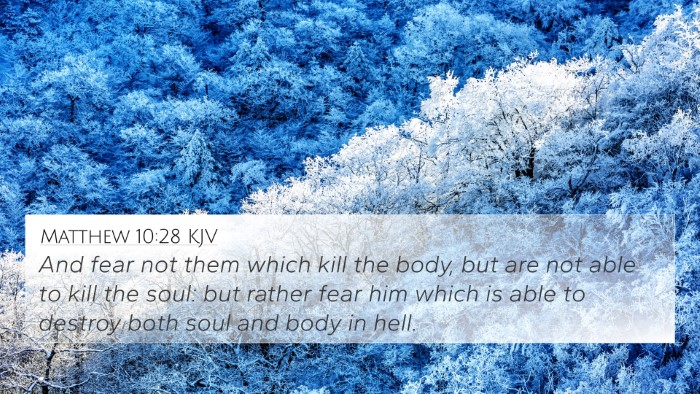
Matthew 10:28 (KJV) »
And fear not them which kill the body, but are not able to kill the soul: but rather fear him which is able to destroy both soul and body in hell.
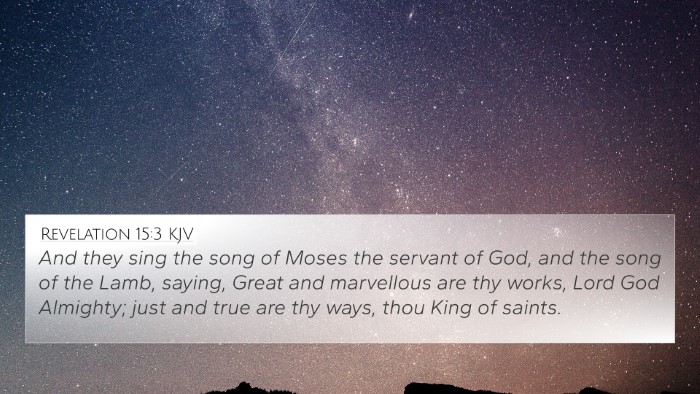
Revelation 15:3 (KJV) »
And they sing the song of Moses the servant of God, and the song of the Lamb, saying, Great and marvellous are thy works, Lord God Almighty; just and true are thy ways, thou King of saints.
Job 13:11 Verse Analysis and Similar Verses
Interpretation of Job 13:11
Job 13:11 states:
"Shall not his excellency make you afraid? And his dread fall upon you?"
This verse captures Job’s profound acknowledgment of God's majesty and the fear it instills in His creation. Following are insights on this verse from various public domain commentaries, offering a comprehensive understanding that connects this scripture to the overarching Biblical narrative.
Summary of Commentary Insights
Matthew Henry’s Commentary:
Matthew Henry emphasizes that Job is addressing his friends, reminding them of the inherent fear and awe that accompany an encounter with the divine. God’s greatness is designed to instill reverence among humans, challenging Job’s friends to reflect on the seriousness of their words against him.
Albert Barnes' Notes:
Barnes points out the psychological aspect of this verse. Job asks rhetorically how they can speak so carelessly about God, whose might is beyond comprehension. The sense of dread indicates an awareness of their own moral shortcomings in the presence of such divine authority.
Adam Clarke’s Commentary:
Clarke notes that the "excellency" refers to God's holiness and perfect justice, which should invoke fear and reverence when pondering the weight of their accusations against Job. He suggests that true wisdom entails recognition of God’s nature and the implications for human behavior.
Thematic Connections to Other Bible Verses
Job 13:11 connects with several other Scriptures that reflect on the themes of God’s majesty, human reverence, and moral accountability. Here are some cross-references:
- Psalm 33:8: "Let all the earth fear the LORD; let all the inhabitants of the world stand in awe of him." - This verse parallels Job’s theme of reverence towards God's glory.
- Isaiah 6:5: "Woe is me! For I am lost; for I am a man of unclean lips..." - Isaiah’s reaction to a vision of God’s holiness mirrors the fear and dread Job describes.
- Proverbs 1:7: "The fear of the LORD is the beginning of knowledge..." - This reinforces the idea that reverence for God is fundamental to understanding moral truths.
- Hebrews 10:31: "It is a fearful thing to fall into the hands of the living God." - This New Testament reference underscores the ongoing theme of God’s power and authority.
- Exodus 20:20: "Do not be afraid; for God has come to test you, that the fear of him may be before your eyes..." - Here, the test of reverence by God's presence is similar to Job's reflections.
- Job 25:2-3: "Dominion and fear are with him; he makes peace in his high places. Is there any number to his armies?" - This emphasizes God’s sovereignty and the rightful fear it commands.
- Ecclesiastes 12:13: "Fear God and keep his commandments, for this is the whole duty of man." - This verses succinctly conveys the essence of human duty toward divine authority.
Understanding the Fear of God
The fear of God, as illustrated in Job 13:11, is not merely an instinctive dread but a profound awe that recognizes His holiness and power. It is vital for understanding various Bible verses surrounding God’s character and our relationship with Him. This theme connects through both Old and New Testament teachings, forming an intermingling of thoughts on divine reverence:
- Job 31:4: Reflects Job’s acknowledgment of God’s omniscience about human actions.
- Romans 3:19: Speaks to the universal accountability before God's law.
- Philippians 2:12: Encourages believers to work out their salvation with fear and trembling, reiterating the concept of reverence in belief.
Making Connections: Inter-Biblical Dialogue
In studying Job 13:11, we observe a crucial inter-Biblical dialogue that enriches our comprehension of God’s nature. By identifying connections, we glean insights into:
- The nature of God’s judgment reflected in other scriptures.
- How Biblical authors express reverence in varied contexts, establishing a thematic unity.
- Similarities in emotional responses to God’s greatness, emphasizing human frailty.
Tools for Further Study
For deeper understanding and exploration of thematic Bible verse connections, consider the following:
- Bible Concordance: A comprehensive tool to locate themes and verses systematically.
- Bible Cross-Reference Guide: Essential for navigating links between scriptures.
- Cross-Referencing Bible Study: Methods to analyze how verses interact thematically.
Conclusion
In conclusion, Job 13:11 not only speaks to the individual relationship one might have with God but also opens a broader discourse on the nature of divinity as illustrated in the Bible. Acknowledging God's supremacy is a recurring foundational element throughout the scriptures, forming a coherent theological framework that encourages reverence, moral reflection, and more profound faith. When using tools for Bible cross-referencing, we unlock deeper meanings and find inter-Biblical dialogues that can inform our spiritual journeys.



